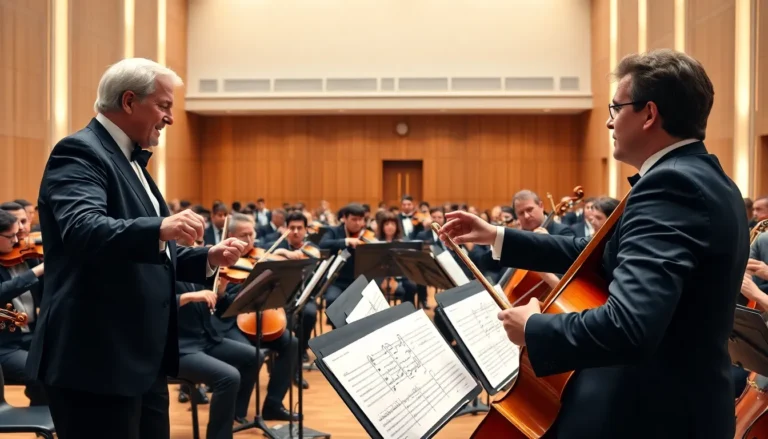Pop music has become a global phenomenon, dominating airwaves and playlists everywhere. But have you ever stopped to wonder who kicked off this catchy craze? Spoiler alert: it wasn’t just one person strumming a guitar in their garage. The origins of pop music are as colorful and varied as a rainbow at a music festival.
From the swinging sounds of the ’50s to the glittering icons of today, the journey of pop is filled with twists, turns, and a few unexpected dance breaks. While some might argue it all began with Elvis shaking his hips, others might point to the infectious melodies of The Beatles. So, grab your headphones and get ready to dive into the rich history of pop music and discover who truly deserves the crown for starting it all.
Table of Contents
ToggleThe Origins of Pop Music
Pop music emerged as a distinct genre in the mid-20th century, shaped by a variety of musical influences and societal changes. Its beginnings illustrate a rich tapestry of sound and culture.
Defining Pop Music
Pop music represents a broad genre characterized by its appeal to the mass audience. The structure often includes catchy melodies, relatable lyrics, and a verse-chorus format. Creators utilize various styles, blending rock, R&B, and electronic elements to forge its identity. Accessibility remains key, making it popular across demographics, and its essence lies in the emotional connections formed through music.
The Evolution of Popular Music
Popular music has undergone significant transformations since the 1950s. Initially, artists like Elvis Presley and Chuck Berry introduced rock and roll, captivating listeners and setting the stage for pop’s growth. The 1960s and 1970s saw the rise of bands such as The Beatles and The Beach Boys, pushing boundaries and experimenting with sound. As technology advanced, the 1980s introduced synthesized music, with artists like Michael Jackson and Madonna leading the charge. Subsequent decades embraced genres like hip hop and electronic dance, continuing to influence contemporary pop music’s landscape. Each era contributed its distinct flair, reflecting social and cultural shifts, thus marking the evolution of this vibrant genre.
Influential Artists in Early Pop

Early pop music drew significant influence from various genres, shaping its identity and broad appeal.
The Impact of Jazz and Blues
Jazz introduced complex rhythms and improvisation to popular music. Blues, with its emotional depth, added a powerful narrative element to song lyrics. Artists like Louis Armstrong and Bessie Smith paved the way for pop musicians, demonstrating the importance of vocal expression and instrumentation. Their blend of styles created a rich tapestry from which pop music emerged. The emotional authenticity found in blues resonated deeply with audiences, setting a foundation for artists to explore similar themes in pop.
The Role of Rock and Roll
Rock and roll emerged in the 1950s as a defining force in popular music. Figures such as Chuck Berry and Little Richard showcased energetic performances and catchy melodies, drawing young listeners. Rock’s fusion of rhythm and blues created a vibrant sound that captivated the masses. Elvis Presley’s charismatic presence and unique style further propelled the genre into mainstream popularity. This exciting genre paved the way for pop’s evolution, leading to artists who experimented with diverse musical elements, ensuring rock’s influence remained integral.
Key Figures in Pop Music History
Pop music’s history features several pivotal figures who shaped its evolution and popularity. These artists laid the groundwork for the genre’s development, blending various musical styles and cultural influences.
Elvis Presley: The King of Rock and Roll
Elvis Presley revolutionized the music scene in the 1950s. Known for his dynamic performances and powerful voice, he brought rock and roll into mainstream culture. Iconic tracks like “Heartbreak Hotel” and “Hound Dog” showcased his unique fusion of rhythm and blues with country elements. Not only did he captivate audiences, but his charismatic persona also helped define the image of a pop star.
His impact extended beyond music, influencing fashion and youth culture. Elvis became synonymous with rebellion and freedom during a transformative era. His enduring legacy continues to resonate in contemporary music, establishing him as a foundational figure in pop history.
The Beatles: The British Invasion
The Beatles emerged in the early 1960s, marking the start of the British Invasion. This iconic quartet—composed of John Lennon, Paul McCartney, George Harrison, and Ringo Starr—changed the landscape of popular music. Hits like “Hey Jude” and “I Want to Hold Your Hand” captured the hearts of millions worldwide. Innovative songwriting and studio experimentation distinguished their sound from others at the time.
They blended various genres, incorporating elements of folk, rock, and pop. Their social commentary and relatable lyrics resonated deeply with a diverse audience. The cultural impact of The Beatles extended beyond music, influencing fashion, art, and even politics. Their contribution solidified their role as legendary figures in pop music history.
Contemporary Influences on Pop
Contemporary pop music reflects a rich tapestry of influences and innovations. Artists today mold the genre with a blend of various styles and technology.
The Rise of Pop Stars in the 21st Century
Pop stardom has transformed dramatically in the 21st century. Artists such as Beyoncé, Taylor Swift, and Justin Bieber dominate charts and influence culture. Each star employs unique branding and social media strategies, enhancing connection with fans. Diversity in genres has also emerged, incorporating elements of hip-hop, EDM, and indie music. These shifts cater to evolving tastes and showcase musical versatility. Collaboration remains a vital trend, with artists frequently working across genres, leading to exciting musical fusions.
The Role of Technology in Pop Music
Technology significantly influences modern pop music production and distribution. Digital platforms enable immediate access to a global audience, reshaping how artists release their music. Streaming services like Spotify and Apple Music offer listeners a vast catalog, fostering competition among artists. Social media allows musicians to engage directly with fans, promoting new releases and tours. Music production has also evolved, utilizing software that empowers artists to create polished recordings at home. Overall, technology enhances the reach of pop music while transforming the creation process.
The journey of pop music is a testament to its rich and diverse influences. It’s a genre that continues to evolve with each passing decade. Key figures like Elvis Presley and The Beatles played pivotal roles in shaping its sound and cultural significance.
Today’s pop music reflects a blend of various styles and technological advancements that keep it fresh and relevant. As new artists emerge and push creative boundaries, the genre remains a dynamic force in the music industry. Understanding the roots of pop music offers valuable insights into its ongoing transformation and enduring appeal.



